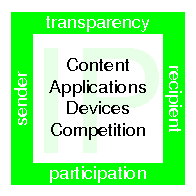 Who would have thought that twitter and facebook could foment a revolution?
Yet Wael Ghonim says it did. He’s one of the people behind the
“We are all Khaled Said” facebook page, and he spent a dozen days in jail for it:
Here’s his
TED Talk:
Who would have thought that twitter and facebook could foment a revolution?
Yet Wael Ghonim says it did. He’s one of the people behind the
“We are all Khaled Said” facebook page, and he spent a dozen days in jail for it:
Here’s his
TED Talk:
“Because of the Internet, the truth prevailed.
And everyone knew the truth.
And everyone started to think that this guy can be my brother.”
Here’s a post from that facebook page on 3 March 2011:
“I really want you ALL to understand that your support to Free Egypt & Egyptians is vital. Don’t you ever think that sitting on FaceBook supporting & commenting help help Egypt. A whole revolution started on Facebook & is now bringing Freedom & starting a new modern Egypt.”
Other Egyptian organizers say similar things:
“Online organising is very important because activists have been able to discuss and take decisions without having to organise a meeting which could be broken up by the police,” he said.’( “Internet role in Egypt’s protests,” by Anne Alexander, BBC, 9 February 2011.)
Many of the Egyptians involved were poor and not usually thought of as Internet users, but David D. Kirkpatrick expalined that in the NY Times 9 Feb 2011, Wired and Shrewd, Young Egyptians Guide Revolt:
The day of the protest, the group tried a feint to throw off the police. The organizers let it be known that they intended to gather at a mosque in an upscale neighborhood in central Cairo, and the police gathered there in force. But the …organizers set out instead for a poor neighborhood nearby, Mr. Elaimy recalled.The NY Times story goes into detail about how the online organizing interfaced with and instigated the initial meatspace protests.Starting in a poor neighborhood was itself an experiment. “We always start from the elite, with the same faces,” Mr. Lotfi said. “So this time we thought, let’s try.” ‘
And you don’t need a laptop or a desktop computer to use social media. As Reese Jones points out,
in 2010 75% of the population of Egypt had cell phones (60 million phones in service likely with SMS) possible to message via Facebook via SMS at http://m.facebook.com/.And this was all after similar efforts in Tunisia had successfully exiled their tyrant and inspired the Egyptians, who in turn inspired the Lybians, etc. And what inspired the Tunisians to start was Wikileaks posts of U.S. cables showing the U.S. thought the Tunisian dictator was just as clueless and corrupt as the Tunisians thought.
So yes, social networking on the Internet has fomented multiple revolutions.
-jsq
